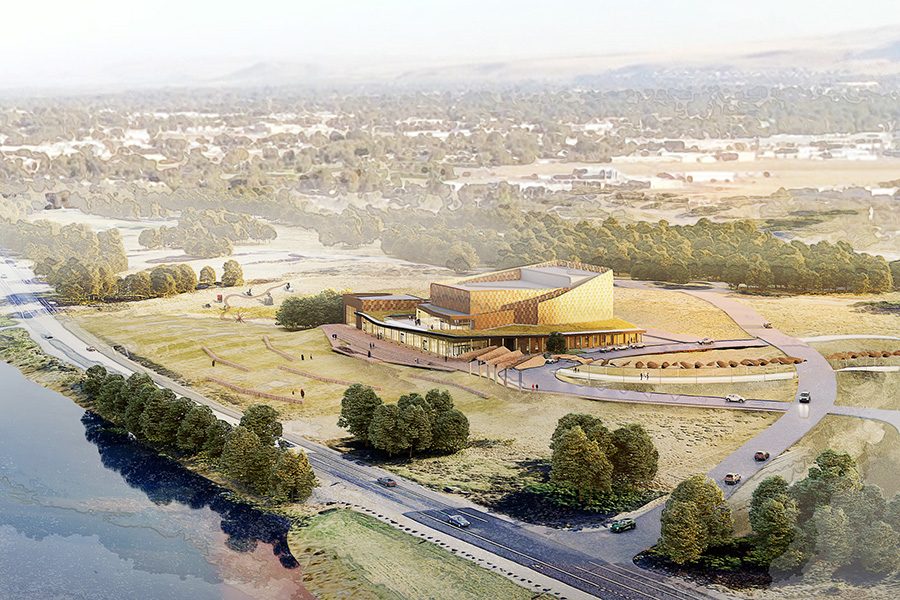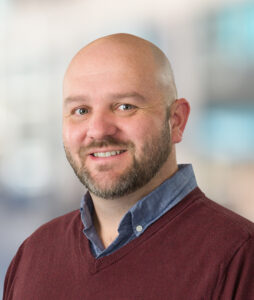
Home » Richland voters to decide fate of proposed performing arts center
February 2025 special election
Richland voters to decide fate of proposed performing arts center

An artist’s rendering of the proposed performing arts center in Richland. A sales tax increase to fund the project will go before voters in February 2025.
Courtesy Arts Center Task ForceDecember 13, 2024
Richland’s Public Facilities District is now carrying the flag in the latest attempt to bring a performing arts facility to the Tri-Cities.
The PFD’s board of directors in October unanimously approved putting a measure on the February 2025 special election ballot asking Richland voters for a two-tenths of a percent sales tax increase for 30 years to provide the bulk of the funding for the estimated $81 million project. If passed, the tax would cost 2 cents on a $10 purchase.
The ballot measure is the culmination of more than a decade of advocacy by the Arts Center Task Force, said Blake Smith, the task force’s executive director. Its officials presented a more than 100-page report to the PFD ahead of the ballot decision, outlining not just the construction costs, but that of operations, as well as details on how such a facility would impact the community.
Steven Wiley, the PFD’s board president and a former member of the task force, said the task force thoroughly examined every aspect of the project and put forth a solid proposal. And while private funding will still be needed, securing sales tax revenue will provide the foundation needed to move forward.
“The only physical way you can do something like this is through a public facilities district,” Wiley said.
Riverside location
Based on the proposal documents, the task force calls for the arts center to be built in Columbia Park West, near the Reach Museum. It would include a main theater with seating for about 800 people, a 2,500-square foot community space, gallery, offices, kitchen and support spaces for performance groups.
Performance spaces would include the technical and logistical infrastructure necessary to support local performing arts groups as well as some regional and national tours.
Construction would cost roughly $54 million of the estimated $81 million needed for the project and would take roughly 18 months with construction tentatively starting in 2027, according to the task force’s report to the PFD.
According to the task force’s proposal, revenue from the sales tax would generate about three-quarters of the funding needed to build the arts center, with the remainder – about $19 million – coming from grants and private contributions.
The task force, which would operate the facility, estimates the theater space alone would host at least 150 events per year with a total projected audience of more than 60,000 people. The report projects that the art center’s revenues would be above expenses, with two-thirds coming from events and programming.
“The demand for a center is high, the funding is available to build it, and it would be self-sustaining. Not only would a performing arts center have a very positive economic impact on the Tri-Cities, but it would also have a far greater impact on quality of life and our ability to attract people to visit and live here,” according to the task force’s report to the PFD.
Community support
About two dozen arts organizations are partners or supporters of the arts center proposal, with four civic organizations – Richland Chamber of Commerce, Tri-City Regional Chamber of Commerce, Tri-City Development Council (TRIDEC) and Visit Tri-Cities – formally endorsing it.
“Once completed the center will be an excellent recruitment and retention tool for employers. In addition, a vibrant arts community will attract and keep young adults in the Tri-Cities,” said Kim Shugart, Visit Tri-Cities’ senior vice president, in a letter of endorsement.
A new space for performances would add to the Tri-Cities’ limited roster of theaters with its proposed seating capacity putting it in the middle of the pack.
Kennewick’s Toyota Center is the largest events facility in the Tri-Cities, though its seating capacity depends on the type of event the facility is hosting. For theater productions, it has nearly 2,100 seats available.
The Richland High School theater, the largest dedicated performing arts stage in the area, has fewer than 1,500 seats since recently being renovated. Kennewick High School’s Art Fuller auditorium has 1,100 seats. The new high school under construction in Pasco will have a 650-seat auditorium – 150 seats less than the proposed arts center. The auditorium for Richland's Chief Joseph Middle School has 760 seats combined in its main and balcony areas.
Smith said the task force determined the size of the facility based on a right-sized mentality. That is, how large of a facility could be built to meet the needs of local performing arts groups while still being financially sustainable for the community.
“A bigger hall can bring in bigger acts but it wouldn’t fit our community,” Smith said. “You don’t just double the seating and double the cost. Rather, the costs go up exponentially.”
Proposed sales tax
The proposed tax increase would put Richland’s sales tax on level with Pasco and Walla Walla. If approved, it would generate nearly $4.3 million in 2026 for the arts center project, with the amount projected to increase in the years following.
The task force deliberately suggested that the PFD put a sunset on the sales tax increase, Smith said. While that funding is necessary for construction, the arts center is intended to be self-sustaining in the long term.
Wiley stressed that the impact on individual residents from the sales tax would be limited, with companies and corporations providing the lion’s share via their own construction and expansion projects.
“It really is a tax on the economy rather than the citizens,” he said.
Voters have rejected past ballot measures to pay for performing arts spaces at Three Rivers Convention Center and Vista Field in Kennewick.
Wiley said those efforts were different from Richland PFD’s project as they were for facilities that could be used for performing arts but were not designed exclusively for them. And a survey of about 1,400 Richland residents conducted by an outside firm for the task force indicated that 78% would support a sales tax increase for a performing arts facility.
“It’s not that people are against taxes, they’re against taxes for things they don’t want,” Wiley said.
Latest News Real Estate & Construction Local News Arts & Culture
KEYWORDS December 2024
Related Articles
Related Products




